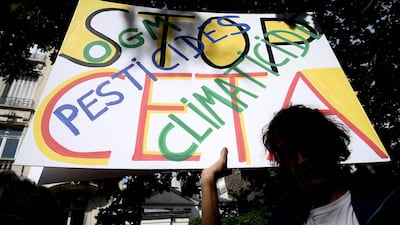The French parliament voted on Tuesday evening to ratify a trade deal between the EU and Canada, despite strong calls for it to be rejected.
More than 90 per cent of the Comprehensive Economic and Trade Agreement, known as Ceta, came into force in September 2017 under "provisional application", but ratification by each EU member state will bring it into full effect.
Although the deal was ratified in France, some politicians opposed it.
Former environment minister Nicolas Hulot on Monday tried to convince politicians to block the deal, which he says is unfair to French farmers.
Mr Hulot, a popular former presenter of TV nature programmes, said the deal prioritised the interests of major chemical companies over public health. France bans certain pesticides.
“When all these lobbies are already trying to break down the door, why give them a battering ram with Ceta?” Mr Hulot wrote in an open letter to MPs.
More than 70 organisations took part in protests outside the National Assembly in Paris last week.
“We give the right to multinationals to have recourse to an exceptional court to be able to complain and demand millions in damages and interests if a pesticide is prohibited in a country,” said Karine Jacquemart, executive director of Foodwatch.
French President Emmanuel Macron has come under fire for not giving environmental concerns the priority that other European countries do.
Mr Macron's government says the deal will boost jobs and exports, such as pharmaceuticals, aircraft parts and agricultural machinery.
France's trade surplus with Canada is valued at €621 million (Dh2.54 billion), the EU says.
France is the 14th EU member state to vote on Ceta.
Italy voted against ratifying the deal, and any further rejections could kill it off.

